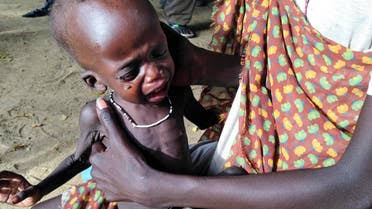A recent analysis conducted by the UN Children’s Fund (UNICEF), UN World Food Programme (WFP) and World Health Organization (WHO) highlights that the ongoing hostilities are worsening the drivers of child malnutrition.
These include a lack of access to nutritious food, safe drinking water and sanitation, and increased risk of disease. The situation is compounded by massive population displacement, as large numbers of people flee the conflict. Sudan is facing an ever-increasing risk of conflict-induced famine that will have catastrophic consequences including the loss of life, especially among young children.
The year-long war is also severely impacting the delivery of humanitarian supplies, leaving countless women and children without access to vital food and nutritional support.
Child malnutrition in Sudan is at emergency levels. In Central Darfur, acute malnutrition is estimated to be at 15.6 percent among children under 5, while in ZamZam camp it’s close to 30%. The situation has deteriorated over recent months, with no sign of abating due to continued conflict and severely hindered humanitarian access.
Acute malnutrition is life-threatening, with malnourished children up to 11 times more likely to die than a well-nourished child.
Levels of malnutrition are particularly worrying among pregnant and breastfeeding mothers. For example, screening carried out last month by Medecins Sans Frontières in ZamZam camp, North Darfur, found over 33 percent of pregnant and breastfeeding women are malnourished, indicating that they are likely sacrificing their own needs to feed their children.
“Children in Sudan are experiencing horrific violence, displacement and trauma – and now they are confronted with potential famine,” said UNICEF Executive Director Catherine Russell. “When children suffer from serious forms of malnutrition, it harms their physical and cognitive development and can leave life-long damage. Parties to the conflict must urgently allow humanitarian access so children can receive food, water, medical care and shelter. But most of all, children need peace.”
WHO Director-General Tedros Adhanom Ghebreyesus said, “Malnutrition is not a one-time crisis. Malnourished children face a lifetime of developmental challenges and ill-health and are also more likely to die from infectious diseases. The clock is ticking, edging Sudan’s mothers and children closer to famine. WHO and partners are on the ground working to prevent and treat acute malnutrition to save precious lives but we need sustained humanitarian access and full financial backing to be able to do this.”
The report acknowledges data gaps due to difficulties in gaining access to conflict hotspots. Despite this, the agencies fear that the situation is extremely critical, and continues to deteriorate. The data gaps in themselves are indicative of a lack of vital humanitarian access in the worst affected areas.
The agencies call for immediate, unimpeded and consistent access to communities who are suffering the worst effects of the brutal and lengthy conflict, through all possible crossline and cross-border routes with neighbouring countries, as well as a de-escalation of the situation in El Fasher and a nationwide ceasefire.

